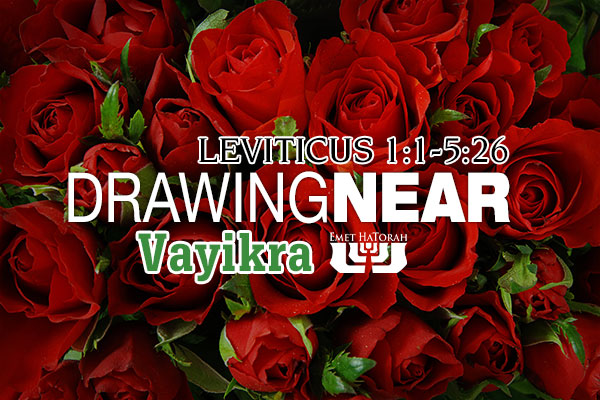Parashat Vayikra - Leviticus 1:1-5:26
Series:

Drawing Near
As we finish the book of Shemot (Exodus) we now turn to the book of Vayikra (Leviticus). When most people begin a study of the book of Leviticus, they probably don’t get that excited. It’s almost entirely focused on animal sacrifices, various sprinklings of blood, bodily discharges, and purification rituals. The modern reader finds a study of Leviticus more repulsive than edifying. This is because these rituals are foreign to the modern reader in a time when animal sacrifice is considered more barbaric than spiritual.
But in the days of the Master, these issues would have been extremely relevant to those wanting to draw near to the God of Abraham, Isaac, and Jacob. Their significance would not have been lost, nor reduced to “types and shadows” as they are often understood today. For Israelites living in a time when the Holy Temple in Jerusalem stood, sacrifices and purification rituals occupied sacred space originating from their Redeemer.
They learned this from a very early age. At the age of five Jewish children begin their Torah studies with the book of Leviticus. Why Leviticus? The midrash explains:
Why do young children commence with The Law of the Priests (i.e. Leviticus), and not with Genesis? Surely it is because young children are pure, and the sacrifices are pure; so let the pure come and engage in the study of the pure. (Midrash Rabbah 7:3)
Paul makes a similar statement in his instruction to Titus that might help us understand this concept:
To the pure, all things are pure, but to the defiled and unbelieving, nothing is pure; but both their minds and their consciences are defiled. (Titus 1:15)
In Hebrew, the overarching term for any kind of offering is the word korban. Given the typical understanding of sacrifices, one would think that this word would be derived from the concepts of extravagant giving, self-deprivation, or even self-annulment. However, the word korban comes from the word karav, which means to draw near. A korban, a sacrifice, is something given to draw near to God. However, we are not to give Him whatever we feel like. We are to give Him what He has asked for.
Consider this. A young man asks his newlywed wife what he can get for her. She responds by saying she would love a bouquet of fresh flowers. Being very practical, the young man begins to reason that this is not a wise choice. After all, flowers will only last a few days and then be thrown into the trash. He should give his worthy bride something with more longevity like a vacuum cleaner or a toaster. But will this fulfill the desire of his bride? The answer is an emphatic “No.” His “thoughtful” gift might even end up being a source of contention.
This is why the prophet Samuel can chastise King Saul for his lavish sacrificial offerings by saying, “Behold, to obey is better than sacrifice, and to listen than the fat of rams” (1 Samuel 15:22). Saul had missed the concept of sacrifice entirely. He tried to approach God on his own terms. He believed that giving Hashem the choicest selections from his spoils would negate his disobedience. He tried to use his sacrifices to assuage God’s anger, rather than for their intended purpose of drawing closer to Him. His disobedience created distance from Hashem that his korbanot could not reconcile.
True love will love a person in the way they need to be loved, rather than the way we think they should be loved. Too many times we try and approach Hashem on our own terms. The sacrificial system is Hashem’s love language. By studying the laws of the korbanot in Leviticus, we draw near to God in a way that is on His terms rather than our own. Why not spend a little extra time learning about their details so that we can draw close to our God?








